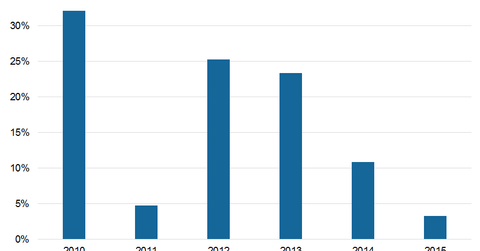KKR Enhances Dividends and Repurchase Program on Growth
KKR & Company (KKR) is creating value for shareholders through share dividends and repurchases.
March 10 2017, Updated 7:36 a.m. ET

Rewarding shareholders
KKR & Company (KKR) is creating value for shareholders through share dividends and repurchases. As of February 2017, the company bought back 31.7 million common units for $459 million of its announced $500 million share repurchase program in October 2015.
In addition, 5.2 million granted equity awards valued at $79 million were canceled until February 2017. In total, 36.9 million common units have been retired on a fully diluted basis since October 2015. The board has approved an additional $250 million for repurchases in 2017.
KKR has announced an increase in its quarterly dividend from $0.16 to $0.17 in 1Q17. The company continues with its fixed and lower dividend policy in a bid to retain more profits and earn capital gains for shareholders. Prior to the current policy, it distributed 75%–80% of its distributable earnings at an annualized yield of ~8%. The current payouts translate into a dividend yield of 3.6% on an annualized basis.
New policy leaves more cash
KKR’s new dividend policy has enabled the company to have more liquidity in hand, which is reflected in its cash and dry powder strength. Its employees and senior management hold ~45% of the company’s shares. With a balance sheet of $13.3 billion on December 31, 2016, its annualized distribution yield now stands at 3.6%.
KKR’s competitors have the following returns on equity:
Together, these companies make up 4.1% of the PowerShares Global Listed Private Equity ETF (PSP). KKR has managed a CAGR (compound annual growth rate) of 13% on its book value over the past six years. The company believes that it can provide higher returns to its investors than they can generate themselves.
In the next part, we’ll look at KKR’s valuation, its medium-to-long-term outlook on fundraising, deployments, and profitability.
